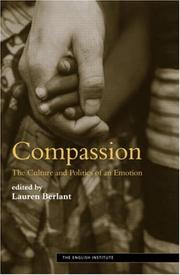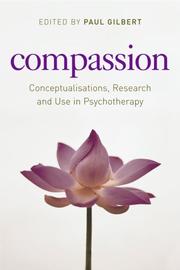| Listing 1 - 10 of 10 |
Sort by
|

ISBN: 1135231648 1135877890 9780203642221 0203642228 9781135231651 1135231656 9780203871096 020387109X 9781135231644 9786610052806 6610052808 9780415970525 0415970520 9780415970518 0415970512 9780203003459 0203003454 9781135443757 1135443750 9781135443702 113544370X 9781135443740 1135443742 9781583919828 1583919821 9781583919835 158391983X 1280052805 9781135231606 Year: 2004 Publisher: New York
Abstract | Keywords | Export | Availability | Bookmark
 Loading...
Loading...Choose an application
- Reference Manager
- EndNote
- RefWorks (Direct export to RefWorks)
In Compassion, ten scholars draw on literature, psychoanalysis, and social history to provide an archive of cases and genealogies of compassion
Compassion. --- Compassion in literature. --- Compassion --- Compassion in literature --- Compassion (Buddhism) in literature --- Emotions --- Ethics --- Psychology --- Philosophy --- Social Sciences --- Philosophy & Religion

ISBN: 9783110191561 3110191563 9786612195518 1282195514 3110201801 9783110201802 9781282195516 6612195517 Year: 2006 Volume: 21 Publisher: Berlin ; New York : De Gruyter,
Abstract | Keywords | Export | Availability | Bookmark
 Loading...
Loading...Choose an application
- Reference Manager
- EndNote
- RefWorks (Direct export to RefWorks)
Die interdisziplinär angelegte Studie belegt, historische Konzepte rekonstruierend, dass der zu Beginn des 13. Jahrhunderts entstandene ,Parzival' Wolframs von Eschenbach Konzepte von compassio adaptiert und integriert. Zur Klärung des Begriffs dienen Sondierungen in der lateinischen geistlichen Literatur. Dieser zufolge bedeutet compassio um 1200 eine praktisch-ethische bzw. affektive Partizipation und Angleichung an das Leiden des Nächsten bzw. an Christi Passion und bildet dadurch auch einen Verstehensakt, eine Hermeneutik des Leidens. Vergleichbare Konzepte sind zu gleicher Zeit am Hof Hermanns I. von Thüringen (1190-1217) präsent, dem damaligen Zentrum volkssprachiger Literaturproduktion. Sie lassen sich dort vornehmlich aus den Miniaturen des zu Beginn des 13. Jahrhunderts angefertigten ,Elisabethpsalters' erschließen. Vor dem Hintergrund obiger Ergebnisse gewinnt die literaturwissenschaftliche Analyse des Romans an Profil. Compassio bildet im Parzivalteil ein handlungskonstituierendes Element und wird dort, die Handlung spiegelnd, sogar vom Erzähler in Kommentaren und Publikumsanreden aufgegriffen. Die Arbeit wurde mit dem "Zeno Karl Schindler-Preis für Literaturwissenschaft 2006" ausgezeichnet.
Wolfram von Eschenbach --- Compassion in literature. --- Literature. --- Wolfram, von Eschenbach, active 12th century. Parzival. --- Compassion in literature --- Languages & Literatures --- Germanic Literature --- Compassion (Buddhism) in literature --- Wolfram, --- Elisabeth (Thuringia, landgravess), emotion/in literature, compassion/in literature, Middle Ages/literature, Parzival.
Book
ISBN: 9780806151663 0806151668 0806154934 9780806154930 Year: 2016 Publisher: Norman : University of Oklahoma Press
Abstract | Keywords | Export | Availability | Bookmark
 Loading...
Loading...Choose an application
- Reference Manager
- EndNote
- RefWorks (Direct export to RefWorks)
The ability of human beings to feel compassion or empathy for one another—and express that emotion by offering comfort or assistance—is an important antidote to violence and aggression. In ancient Greece, the epics of Homer and the tragic dramas performed each spring in the Theater of Dionysus offered citizens valuable lessons concerning the necessity and proper application of compassionate action. This book is the first full-length examination of compassion (eleos or oiktos in Greek) as a dramatic theme in ancient Greek literature. Through careful textual analysis, James F. Johnson surveys the treatment of compassion in the epics of Homer, especially the Iliad, and in the works of the three great Athenian tragedians: Aischylos, Euripides, and Sophokles. He emphasizes reciprocity, reverence, and retribution as defining features of Greek compassion during the Homeric and Archaic periods. In framing his analysis, Johnson distinguishes compassion from pity. Whereas in English the word “pity” suggests an attitude of superiority toward the sufferer, the word “compassion” has a more positive connotation and implies equality in status between subject and object. Although scholars have conventionally translated eleos and oiktos as “pity,” Johnson argues that our modern-day notion of compassion comes closest to encompassing the meaning of those two Greek words. Beginning with Homer, eleos normally denotes an emotion that entails action of some sort, whereas oiktos usually refers to the emotion itself. Johnson also draws associations between compassion and the concepts of fear and pity, which Aristotle famously attributed to tragedy. Because the Athenian plays are tragedies, they mainly show the disastrous consequences of a world where compassion falls short. At the same time, they offer glimpses into a world where compassion can generate a more beneficial—and therefore more hopeful—outcome. Their message resonates with today's readers as much as it did for fifth-century Athenians.
Multi
ISBN: 1108862179 9781108862172 1108856500 1108495397 9781108495394 9781108818025 1108856438 1108818021 Year: 2021 Publisher: Cambridge Cambridge University Press
Abstract | Keywords | Export | Availability | Bookmark
 Loading...
Loading...Choose an application
- Reference Manager
- EndNote
- RefWorks (Direct export to RefWorks)
This collection is an enquiry into compassion as an early modern emotional phenomenon, situating it within the complexity of European economic, social, cultural and religious tensions. Drawing on recent work in the history of emotions, leading scholars consider the particularities of early modern compassion, demonstrating its entanglements with diverse genres and geographies. Chapters on canonical and less familiar works explore tragedy, comedy, sermons, philosophy, treatises on consolation, medical writing, and dramatic theory, showing how early modern compassion shaped attitudes and social structures that remain central to the way we imagine our response to suffering today, and how such investigations can ultimately provoke new ways of thinking about community in contemporary Europe.
English literature --- Literature and society --- Christianity and literature --- Compassion in literature. --- History and criticism. --- History --- Compassion (Buddhism) in literature --- European literature --- Compassion in literature --- History and criticism --- Thematology --- anno 1500-1599 --- anno 1600-1699
Book
ISBN: 884911737X Year: 2001 Publisher: Bologna : CLUEB,
Abstract | Keywords | Export | Availability | Bookmark
 Loading...
Loading...Choose an application
- Reference Manager
- EndNote
- RefWorks (Direct export to RefWorks)
French fiction --- Compassion in literature. --- Roman français --- Compassion dans la littérature --- History and criticism. --- Histoire et critique
Book
ISBN: 3031449231 Year: 2024 Publisher: Cham : Springer Nature Switzerland : Imprint: Palgrave Macmillan,
Abstract | Keywords | Export | Availability | Bookmark
 Loading...
Loading...Choose an application
- Reference Manager
- EndNote
- RefWorks (Direct export to RefWorks)
This book explores a heretofore unremarked linkage between Bernard Shaw, the twentieth-century French thinker Paul Ricoeur, and Jesus of Nazareth. The ties that bind them are a foundational interest in the social teachings of the Nazarene and their use of a shared dialectics with respect to living the kind of compassionate life that holds out the promise in our contemporary world of achieving something approximating universal wellness on a healthy planet at peace with itself. This work argues that the three principal subjects of the study—independently of one another—used the same dialectical method to reach the same dialectically derived conclusion about how humans can live redemptively in a fractured world. Howard Ira Einsohn was a part-time instructor at Middlesex Community College and Wesleyan University’s Institute of Lifelong Learning for a combined total of 15 years (2004-2019), most of which were spent at the former institution. During this period, he taught courses in writing, advanced writing, technical writing, literature surveys, drama and the short story, as well as courses on Ibsen, Flannery O’Connor, and Tim O’Brien.
Compassion. --- Compassion in literature. --- Jesus Christ. --- Theater --- Religion --- Literature --- Theatre History. --- Philosophy of Religion. --- Literary Theory. --- History. --- Philosophy.

ISBN: 158391983X 1583919821 9781583919828 9781583919835 9786610109456 0203642228 1280109459 0203003454 1135877890 1135443742 1135443750 0415970512 020387109X 1280052805 9004493352 9042009039 Year: 2004 Publisher: London : Routledge,
Abstract | Keywords | Export | Availability | Bookmark
 Loading...
Loading...Choose an application
- Reference Manager
- EndNote
- RefWorks (Direct export to RefWorks)
In Compassion, ten scholars draw on literature, psychoanalysis, and social history to provide an archive of cases and genealogies of compassion
Psychothérapie --- Compassion --- Relations psychothérapeute-patient --- Psychotherapy --- Psychotherapist and patient --- 615.851 --- Psychagogy --- Therapy (Psychotherapy) --- Mental illness --- Clinical sociology --- Mental health counseling --- Patient and psychotherapist --- Psychoanalyst and patient --- Patients --- Emotions --- Psychotherapie. Pschychoanalyse als therapie --- Treatment --- Compassion. --- Compassion in literature. --- Compassion in literature --- Ethics --- Psychology --- Philosophy --- Social Sciences --- Philosophy & Religion --- Compassion (Buddhism) in literature
Multi
ISBN: 9781843843306 9781782040583 1843843307 1782040587 1283836629 Year: 2012 Publisher: Suffolk Boydell & Brewer
Abstract | Keywords | Export | Availability | Bookmark
 Loading...
Loading...Choose an application
- Reference Manager
- EndNote
- RefWorks (Direct export to RefWorks)
'A deeply original work of scholarship. Through fine close readings of primary and secondary texts, the author offers the fullest account we have of the related phenomena of pain, sympathy, and sensation in early modern culture.' Michael Schoenfeldt, John R. Knott, Jr., Professor of English, University of Michigan, Ann Arbor. In late medieval Catholicism, pain was seen as a way of imitating Christ, and as an avenue to salvation. During the early modern period, Protestant theologians came to reject these assumptions, and attempted to redefine and circumscribe the spiritual meaning of suffering. The rethinking of the meaning of pain during the early modern era is the central theme of this book. The author pays particular attention to how literary writers explored the issue of pain, by placing their work in a broad context of devotional, theological, philosophical and medical texts on suffering. In detailed readings of Alabaster, Donne, Herbert, Crashaw, Lanyer, Spenser, Milton and Montaigne, he shows that early modern culture located the meaning of pain in its capacity to elicit compassion in others - yet the nature of this compassion was also fiercely contested. Dr Jan Frans van Dijkhuizen is Lecturer in English Literature at the University of Leiden.
English literature --- Thematology --- anno 1600-1699 --- anno 1500-1599 --- Compassion in literature. --- Englisch. --- Folter. --- Literatur. --- Mitleid. --- Pain in literature. --- Schmerz. --- Early modern. --- History and criticism --- 1500-1700. --- Compassion (Buddhism) in literature --- History and criticism. --- Jacobean poetry. --- Religion. --- poetry.
Book
ISBN: 9780812249705 0812249704 0812294564 Year: 2018 Publisher: Philadelphia : University of Pennsylvania Press,
Abstract | Keywords | Export | Availability | Bookmark
 Loading...
Loading...Choose an application
- Reference Manager
- EndNote
- RefWorks (Direct export to RefWorks)
Compassion in literature. --- Wars of the Huguenots (France : 1562-1598). --- French literature --- Religion and politics --- French literature. --- Religion and politics. --- History and criticism --- History --- 1500-1699. --- France --- France. --- History and criticism.
Book
ISBN: 9782812450563 Year: 2016 Publisher: Paris : Classiques Garnier,
Abstract | Keywords | Export | Availability | Bookmark
 Loading...
Loading...Choose an application
- Reference Manager
- EndNote
- RefWorks (Direct export to RefWorks)
Bâiller fait bâiller, pleurer fait pleurer. D'autres élans corporels ou psychiques, le frisson, l'appétit, le désir sexuel, la confiance, se transmettent ainsi qu'une personne à l'autre. Le latin médiéval dispose d'un terme spécifique pour désigner cette contagion : "compassio", la compassion. Selon l'étymologie, il s'agit d'éprouver ensemble une passion. Pour les auteurs scolastiques, la compassion est une réaction involontaire de l'âme ou du corps qui reflète le comportement d'autrui comme par imitation. La double énigme de la "compassio" - énigme de la trajectoire du mot, énigme du phénomène lui-même - constitue le fil conducteur d'une enquête à travers les sources universitaires du Moyen Âge.
Latin literature, Medieval and modern --- Compassion in literature --- Imitation --- Philosophy, Medieval --- Medicine, Medieval --- Littérature latine médiévale et moderne --- Compassion dans la littérature --- Philosophie médiévale --- Médecine médiévale --- Themes, motives --- Thèmes, motifs --- Théologie --- Compassion --- Histoire --- Littérature latine médiévale et moderne --- Compassion dans la littérature --- Philosophie médiévale --- Médecine médiévale --- Thèmes, motifs --- Philosophie médiévale. --- Théologie chrétienne --- Compassion. --- Histoire.
| Listing 1 - 10 of 10 |
Sort by
|

 Search
Search Feedback
Feedback About UniCat
About UniCat  Help
Help News
News